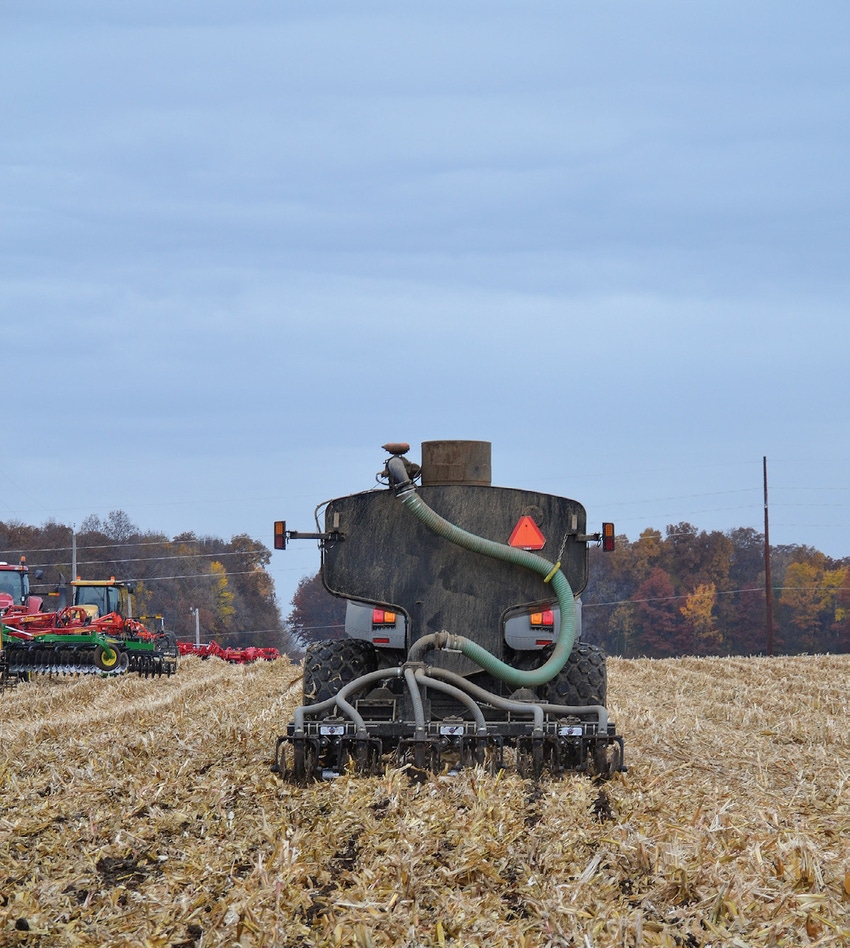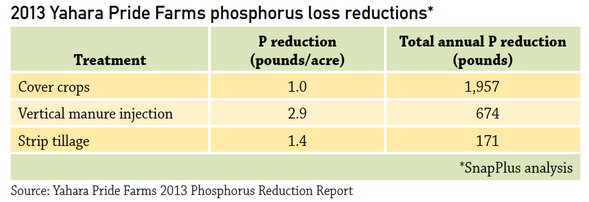April 15, 2015

Farmers in south-central Wisconsin’s Yahara River Watershed are cutting their phosphorus losses by thousands of pounds – before regulators step in with stringent new rules.
About 40 farmers in the watershed have formed Yahara Pride Farms, a nongovernmental education group that aims to cut sediment and phosphorus loads in the Yahara River, which feeds Madison’s chain of lakes. The organization was founded in partnership with the nonprofit Clean Lakes Alliance in 2011, one year after the EPA added the Yahara River to its impaired waters list.
About 200 farmers operate in the 170,000-acre Yahara Watershed, a dairy-farming region in Dane, Rock and Columbia counties that includes the state capital and the Madison area’s five lakes.
“We’re opening the eyes of farmers in the watershed,” says Jeff Endres, Yahara Pride Farms chairman, Waunakee.
The organization offers a farm certification program that helps growers evaluate their water pollution risks and make improvements. The group also developed a cost-share program that lets farmers try new conservation practices without taking a big financial risk, with the following incentives: $20 per acre for 40 acres of strip tillage, 10 hours of free vertical manure injection and $40 per acre for 50 acres of fall cover crops.
This approach to water quality is built on cooperation and education, which has quickly produced significant results, says hog producer Bob Uphoff, Yahara Pride Farms vice chairman. In 2013, the group’s initiatives kept almost 3,000 pounds of phosphorus out of local waterways, according to conservation consultant Dennis Frame, retired director of University of Wisconsin Discovery Farms.
In other regions of the Farm Belt, such as northern Ohio, regulators are imposing new restrictions on farmers to limit water pollution risk, and Total Maximum Daily Loads are being established for more watersheds.
Finding reasonable solutions
“Agriculture plays a large role in nonpoint pollution,” says Uphoff, who farms just outside Madison. “We can fight about it in court, or we can ask, ‘What can we do in agriculture that’s reasonable?’ We need to be leaders and not wait for government regulators or outside groups to say what should be done.”
Yahara Pride Farms’ confidential certification program includes a whole-farm walkover and analysis by one of their conservation resource managers. Producers are scored on cropping and soil fertility, nutrient management, conservation practices, management of non-cropped land and streams and facilities. They receive a report that outlines low, medium and high-risk practices; field-by-field estimates of soil and phosphorus losses; and ideas for correcting problems and funding improvements. Certified farms are eligible for a variety of discounts on agribusiness services.
This process offers “another set of eyes to come in and look at your farm, and act like a coach – without pointing fingers,” Uphoff says.
Most farmers are aware of their problems and most risky practices, Frame says. They would like advice, but because government agencies may have a role in compliance, “growers are reluctant to call them if they suspect a problem.”
In contrast, Yahara Pride Farms’ non-regulatory evaluation allows “an open discussion,” Endres says. His farm became Yahara Pride certified in 2013. He and his brothers, Randy and Steve, milk 500 Holstein cows and grow corn, soybeans, wheat and alfalfa. During their farm walkover, they were advised to stop direct-seeding alfalfa on rolling ground. “Our evaluator pointed out that this is a high risk practice,” Endres says.
Based on a method learned through a Yahara Pride Farms demonstration, after wheat harvest the Endres brothers apply liquid dairy manure using vertical injection, which incorporates up to 15,000 gallons per acre with minimal soil disturbance, cutting the risk of erosion and nutrient loss.
They then immediately plant a cover crop of barley and peas, which is harvested in late fall as forage for a cash payback. In the spring, they no-till alfalfa, corn or soybeans into the previous year’s cover crop root mass, cutting erosion by as much as 50%.
Yahara Pride Farms’ cost-share program helped the Endres brothers try these new techniques. “We can do this on a lot of our acres, and it can be very cost effective,” Endres says.
Documenting conservation
Yahara Pride Farms also documents current farm practices that benefit soil and water quality.
“One question we wanted to answer was, how much conservation is already being done in the watershed?” Frame says. “Farmers don’t always take credit for what they are doing.”
Through the certification program, Yahara Pride Farms will build a database showing how agriculture is doing as a whole in the watershed. “I’m confident most farmers are doing a good job, and this needs to be recognized,” Endres says.
As a result of the program, six farms totaling 12,858 acres were certified in 2013. In 2013 and 2014, 48 farms participated in cost-share programs, which included 2,382 acres of cover crops, 200 acres of strip-till and 3 million gallons of manure applied with vertical manure injection.
Annual P losses were also cut by 2,800 pounds in 2013, with a P savings of over $168,000.

Farmers in south central Wisconsin’s Yahara Watershed prevented nearly 3,000 pounds of phosphorus from entering waterways in 2013 by trying new conservation practices, including cover crops, vertical manure injection and strip tillage. Yahara Pride Farms’ cost-share program let growers try these new water-quality practices without taking a big financial risk.
Voluntary phosphorus reduction program shows results
Yahara Pride Farms’ voluntary education program is helping south central Wisconsin farmers cut phosphorus and sediment losses. The program offers: free farm walkovers and certification; cost-share for new conservation technologies that can improve water quality, such as strip tillage, vertical manure injection and cover crops. Current incentives include: $20/acre for 40 acres of strip tillage; 10 hours of free vertical manure injection; $40/acre for 50 acres of fall cover crops.
The results:
6 farms, totaling 12,858 acres, were certified in 2013.
48 farms participated in cost-share programs in 2013 and 2014, including: 2,382 acres of cover crops; 200 acres strip-tilled; 3 million gallons of manure applied with vertical manure injection.
Annual phosphorus losses cut by 2,800 lbs. in 2013. The dollar value of P savings tops $168,000.
Sources: Dennis Frame and Rachel Fossum, Yahara Pride Farms
About the Author(s)
You May Also Like




